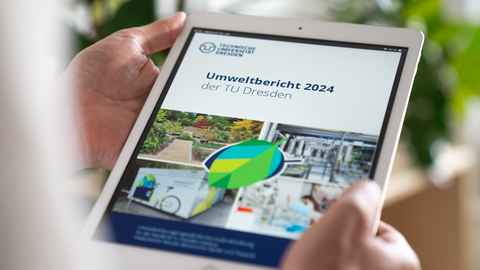Feb 04, 2025
Publication of the 2024 Environmental Report: TU Dresden continues to make progress towards greater environmental protection and sustainability
TUD Dresden University of Technology has published its 2024 environmental report. The report keeps track of last year’s developments and progress in the area of environmental protection at TUD - in this case for 2023. The most important results include improvements in climate and corporate environmental protection, the reduction of resource consumption and the implementation of a number of measures as part of TUD's sustainability strategy. Even before the report was published, external experts from the Eco Management and Audit Scheme (EMAS) had already lauded TUD for its continual improvement in terms of environmental protection.
"At a time when the consequences of climate change and environmental degradation are becoming more and more obvious and the careful use of natural resources is more and more critical, it is our responsibility, as an excellent educational and research institution, to actively contribute to solving these problems," explains Prof. Roswitha Böhm, Vice-Rector University Culture at TUD. In addition to measures to reduce energy consumption, waste and emissions and at the same time promote renewable energies, the report highlights the integration of sustainable development principles into our curricula and research projects.
The report also documents environmentally relevant developments in the following areas of activity: energy, climate protection, waste, sustainable campus design, mobility, research, teaching, as well as governance and communication. In addition to the consumption figures, the report also includes information on current research projects, courses whose content focuses on the environment and environmental management.
The significance of the attentive use of natural resources at TUD had an honorable mention in the results of the QS World University Rankings: Sustainability. In this prestigious ranking, TUD climbed more than 100 places compared to 2023, from 181st to 80th place, making it one of the TOP 100 internationally and amongst the top five percent in the areas of environmental and social compatibility.
Implementation of measures to reduce energy consumption, waste and emissions
Upon closer inspection of a number of environmental indicators, we can deduce the following: District heating and natural gas consumption fell more sharply than in previous years. Electrical energy consumption - as well as the volume of waste produced - is below pre-COVID levels. Paper consumption is declining. Drinking water consumption increased somewhat compared to the previous year, but is falling overall. It is still slightly below the amount of water being consumed before the COVID lockdowns.
"The environmental report is not just nomenclature; it represents a collaborative process with measures that are continuously evolving. All member of TUD can make a difference: by working together, we promote a culture of sustainability that has an impact beyond the boundaries of our university," Prof. Böhm affirms.
Eco Management and Audit Scheme (EMAS) confirms success
Transparent reporting on consumption values, action planning and monitoring to improve environmental performance are all key components of the EMAS environmental management system. EMAS has been part and parcel of TUD since 2023. In December 2024, independent experts came to the university for its ninth revalidation. Their program included visits to laboratories and workshops as well as participation in discussions at the individual organizational units of TUD.
The auditors praised TUD's activities to continuously improve its environmental standing and found no deviations from the EMAS regulation. In addition to the TUD|Südvorstadt Campus, the Botanical Garden, the Faculty of Medicine and the TUD|Tharandt Campus participate in EMAS. "For many years, EMAS environmental management has provided a continuous and solid basis for corporate environmental protection in order to transparently track the development of environmental indicators and to derive and implement effective measures," explains Vice-Rector Böhm.
Background information:
Contact:
Stephan Schöps
Infrastructural Facility Management
Tel.: + 49 351 463-39989
Email:

